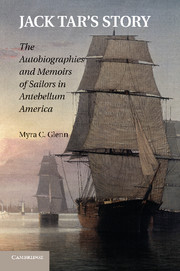Book contents
- Frontmatter
- Contents
- Acknowledgments
- List of Abbreviations
- Introduction: Why Study Antebellum Sailor Narratives
- 1 Stories of Escape, Freedom, and Captivity: Seamen Authors Recall Their Early Years
- 2 Manhood, Nationalism, and Sailor Narratives of British Captivity and the War of 1812
- 3 Exploring the Meaning of Revolution in the Americas: Sailor Narratives of the Haitian and South American Wars of Independence
- 4 Defending One's Rights as a Man and an American Citizen: Sailor Narratives as Exposés of Flogging
- 5 Straddling Conflicting Notions of Masculinity: Sailor Narratives as Stories of Roistering and Religious Conversion
- Afterword
- Appendix
- Index
4 - Defending One's Rights as a Man and an American Citizen: Sailor Narratives as Exposés of Flogging
Published online by Cambridge University Press: 05 October 2010
- Frontmatter
- Contents
- Acknowledgments
- List of Abbreviations
- Introduction: Why Study Antebellum Sailor Narratives
- 1 Stories of Escape, Freedom, and Captivity: Seamen Authors Recall Their Early Years
- 2 Manhood, Nationalism, and Sailor Narratives of British Captivity and the War of 1812
- 3 Exploring the Meaning of Revolution in the Americas: Sailor Narratives of the Haitian and South American Wars of Independence
- 4 Defending One's Rights as a Man and an American Citizen: Sailor Narratives as Exposés of Flogging
- 5 Straddling Conflicting Notions of Masculinity: Sailor Narratives as Stories of Roistering and Religious Conversion
- Afterword
- Appendix
- Index
Summary
The most riveting part of Two Years Before the Mast occurs when Dana describes how his shipmates writhed in agony and begged for mercy when they were flogged for little or no reason. Dana portrayed the captain of the Pilgrim as a sadistic tyrant, a man who “danced about deck, calling out as he swung the rope, – ‘If you want to know what I flog you for, I'll tell you. It's because I like to do it! – because I like to do it! – It suits me! That's what I do it for!’” Dana recalled that he felt so “disgusted, sick, and horror-struck” at his captain's actions that he “turned away” and refused to watch punishment (155).
Dana may have looked away during the infliction of floggings on board the Pilgrim but his vivid recollection of these punishments forced readers to face the pain, horror, and sadism of this form of discipline. Although earlier seamen authors such as Nathaniel Ames had condemned the practice of flogging, Dana offered the most famous discussion of this issue. The success of his 1840 memoir encouraged later sailor writers to detail how they and their shipmates regularly suffered a range of punishments, including confinement in irons, beating with fists, rattans, and other weapons. But like Dana, these men singled out flogging as a particularly objectionable form of discipline.
- Type
- Chapter
- Information
- Jack Tar's StoryThe Autobiographies and Memoirs of Sailors in Antebellum America, pp. 112 - 143Publisher: Cambridge University PressPrint publication year: 2010



